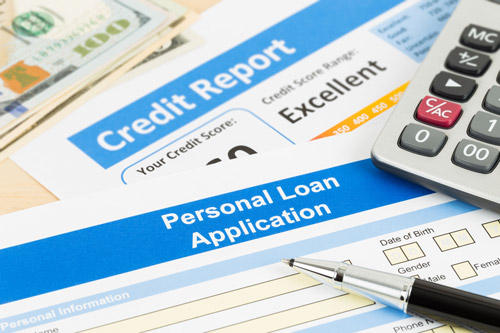Your Credit Score determines how much you have to pay for any type of credit. You will get better interest rates on credit cards, auto loans and home mortgages with a good score. A priority for everyone should be to maintain a good credit score. Find out what information the reporting bureaus use to calculate your score.
What Makes up a Credit Score
 Credit scoring is a numerical calculation based on information contained in a person’s credit file. It sums up how well an individual manages credit. The most common model today is by Fair, Isaac & Company (FICO). Equifax, Experian, and Trans Union are the three biggest reporting agencies. These reporting agencies use the FICO model. Credit reports are kept electronically by the three national reporting agencies.
Credit scoring is a numerical calculation based on information contained in a person’s credit file. It sums up how well an individual manages credit. The most common model today is by Fair, Isaac & Company (FICO). Equifax, Experian, and Trans Union are the three biggest reporting agencies. These reporting agencies use the FICO model. Credit reports are kept electronically by the three national reporting agencies.
Your credit score is calculated by analyzing all the pieces of information in your credit file and summarizing them into a number. Each credit bureau’s score for an individual may be different because the credit history each agency has about them may be different.
Types of information included in the report
- Identifying Information
- Credit Information
- Public Record Information
- Inquiries
Credit Score Factors
- Payment History – 35%
- The Amount You Owe – 30%
- Length of Credit – 15%
- Recent Credit Accounts – 10%
- Types of Credit Used – 10%
A FICO score can range from 300-850. Most individuals have credit scores in the 600 to 700 range.
Strategies to Improve Your Credit Score
The good news is that a low score doesn’t have to follow you forever. If you lower your debt and improve payment histories, your credit score will improve.
- Get your credit card bills paid down. It is a good practice to pay off the entire balance every month on your accounts.
- Do not transfer debt from one credit card to another.
- Don’t open a lot of credit card accounts quickly to build a credit record.
- Pay off taxes owed in a lump sum, not in installments to reduce your overall level of debt.
- Check your credit report regularly for accuracy.
- Avoid finance companies which charge high fees and rates.
- After credit difficulties, wait 12 months to apply for a mortgage.
- When shopping for a mortgage loan, make your inquiries to the different lenders around the same timeframe. The same type of inquiries will only count as one on your credit report.
- Don’t buy appliances or new furniture for your new home until after you close on the property. This new purchase will add to your debt calculation with the bank. Wait until after closing to make a necessary purchase.
Fixing Errors on Your Credit Report
If you find mistakes and you wish to dispute or change the mistake, contact the national credit company that furnished the report. Under the Fair Credit Report Act (FCRA), the credit bureau must complete an investigation of your disputed item within 30 days and provide you a written notice of the results of the investigation within five days of its completion. If your credit report changes based upon the dispute, a copy of the new report will be forwarded to you. The Federal Trade Commission (FTC) enforces FCRA. The FTC also publishes consumer-related credit brochures.
Review your credit report before you apply for a home loan. If there is a mistake on the report, it will take time to have the error corrected. It is better to have this done before you are under contract on a property.
Loan Processing & Credit Scores
 Credit scores are used today because they speed up the mortgage approval process for consumers. When a loan officer is asked to prequalify you for a home loan, they will pull your credit report. Based on the information in the report, they will tell you what type of loan and interest rate you would qualify for.
Credit scores are used today because they speed up the mortgage approval process for consumers. When a loan officer is asked to prequalify you for a home loan, they will pull your credit report. Based on the information in the report, they will tell you what type of loan and interest rate you would qualify for.
Besides your credit score, the lender reviews other information in deciding whether to approve your home mortgage. All of this information combined makes up your Loan Profile.
The Bank’s Underwriting Department looks at the following information in deciding on whether to approve your mortgage loan.
- Employment History
- Monthly Debt Payments
- Amount in Savings
- Type of Loan
- Appraised Value of the Property
- Down Payment
You might also enjoy – Buying a Home in Lexington, NC
New Homes in Davidson County, NC
Price Range: $125,000 – $200,000
Contact Information for Credit Resources
Equifax
Credit Information Services
P.O. Box 740256
Atlanta, Georgia 30374
Phone: 1 (800) 685-1111
Website: www.Equifax.com
Experian
National Consumer Assistance Center
P. O. Box 949
Alien, TX 75013
Phone 1 (800) 682-7654
Website: www.experian.com
Trans Union
National Disclosure Center
P.O. Box 390
Springfield, PA 19064
Phone: 1 (800) 888-4213
Website: www.tuc.com
Federal Trade Commission
Public Reference Branch
6th & Pennsylvania Avenue, N.W.
Washington, DC 20850
Phone: (202) 326-2222
Website: www.ftc.gov/ftc/consumer.htm
FICO
Phone: 1 (800) 342-6726
Website: www.myfico.com
Annual Credit Report Service
P.O. Box 105281
Atlanta, GA 30348
Phone: 1 (877) 322-8228
Website: www.annualcreditreport.com

